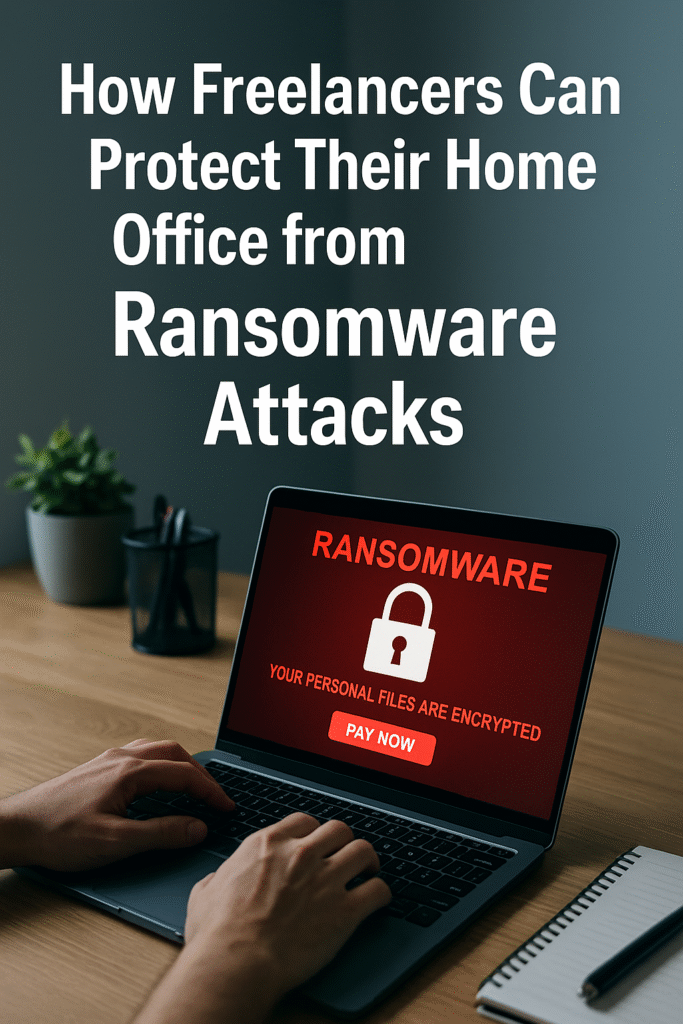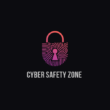
Table of Contents
How freelancers can protect their home office from ransomware attacks has become one of the most important cybersecurity concerns in 2025. Ransomware attacks are no longer targeting just large corporations — freelancers and small business owners are now on the front lines. With more professionals working remotely and storing sensitive client data on personal devices, cybercriminals see freelancers as easy targets. Understanding the risks and taking preventive steps is now a critical part of running a secure online business and to protect freelance business from ransomware.
This guide will explain what ransomware is, how it can infect your system, and what practical steps you can take today to protect your devices, data, and clients from costly cyber threats.
What Is Ransomware and Why Freelancers Are at Risk
Ransomware is a type of malicious software that encrypts your files or locks you out of your computer until a ransom is paid—usually in cryptocurrency. Once infected, your data becomes inaccessible, and recovering it without a backup or professional help can be nearly impossible.
Freelancers are especially vulnerable because they often:
- Use personal devices for work and communication
- Lack enterprise-level cybersecurity systems
- Store sensitive client data on local drives or cloud services without encryption
A single ransomware infection can destroy your business reputation, cost you projects, and put your clients’ data at risk. That’s why learning how freelancers can protect their home office from ransomware attacks should be part of your professional routine.
Freelancers are especially vulnerable because they often:
- Use personal devices for work and communication
- Lack enterprise-level cybersecurity systems
- Store sensitive client data on local drives or cloud services without encryption.
A single ransomware infection can destroy your business reputation, cost you projects, and put your clients’ data at risk. That’s why learning how freelancers can protect their home office from ransomware attacks should be part of your professional routine.
Step 1: Use Reliable Antivirus and Anti-Ransomware Software
Your first line of defense is a reputable antivirus tool with built-in ransomware protection for freelancers. Modern security suites can detect and block suspicious files before they encrypt your data.Top-rated antivirus solutions like Bitdefender or Norton 360 provide real-time protection and cloud backups to help you recover files safely if you ever get attacked.If you’re a freelancer on a budget, free versions of these tools still offer excellent protection — just make sure automatic updates are enabled.
Step 2: Keep Your Software and Operating System Updated
Ransomware often spreads through known vulnerabilities in outdated software. When you skip updates, you’re leaving open doors for attackers to exploit.Set your system to automatically install security patches for:Operating system (Windows, macOS, Linux)* Browser and extensions Office tools and productivity appsRegular updates close security loopholes and significantly reduce your risk of infection.
Step 3: Backup Your Data the Right Way
Even the most secure systems can get hit. That’s why having a reliable backup plan is essential.In order to protect freelance business from ransomware.
Follow the 3-2-1 backup rule:
- Keep 3 copies of your data
- Store them on 2 different types of storage (e.g., local drive and cloud)
- Keep 1 copy off-site or offline
Use trusted encrypted cloud storage like Sync.com or Proton Drive to safely store client files. In case of an attack, you can restore your data quickly without paying any ransom
Step 4: Strengthen Your Email Security
Many ransomware infections start with phishing emails that trick users into downloading malicious attachments. Freelancers who regularly communicate with new clients via email are especially at risk.
To protect freelancer data security, follow these
- Avoid opening attachments from unknown senders
- Hover over links before clicking to verify authenticity
- Use encrypted email services like Proton Mail
- Install anti-phishing browser extensions such as uBlock Origin or Privacy BadgerThese tools help detect suspicious content and block harmful scripts automatically.
Step 5: Use a VPN When Working Online
A VPN (Virtual Private Network) encrypts your internet connection, making it difficult for hackers to intercept your data. Whether you’re working from a home office, café, or shared network, using a VPN ensures your online activity remains private.A reliable option like Surfshark VPN offers secure connections, malware blocking, and multi-device protection — ideal for freelancers who handle sensitive client data remotely.
Step 6: Implement Strong Password and Authentication Practices
Weak passwords are one of the easiest ways ransomware spreads through shared accounts or cloud platforms. Always use unique, complex passwords for each account and enable two-factor authentication (2FA) wherever possible.Consider using a password manager such as 1Password or Bitwarden to generate and store your passwords securely. These tools also alert you if your credentials appear in data breaches.
Step 7: Educate Yourself and Your Clients
Home office Cybersecurity awareness is on one of the most powerful defenses against ransomware. Take time to learn about current scams, new attack methods, and safe online habits. Share this knowledge with your clients — especially if you exchange sensitive data or access their systems.
You can follow trusted cybersecurity blogs like Krebs on Security or Cybersecurity & Infrastructure Security Agency (CISA) for updates on the latest ransomware trends and safety guidelines.
Step 8: Separate Work and Personal Devices
Freelancers often use the same computer for personal browsing, social media, and work tasks — a dangerous habit. Keeping separate accounts or devices helps reduce exposure to malicious downloads and phishing attempts.At a minimum:Create separate user profiles for work and personal useAvoid installing unnecessary apps on your work deviceUse different browsers or sandbox environments for testing filesThis small step helps isolate potential threats and keeps your client data secure.
Step 9: Create an Incident Response Plan
Even with all precautions, no system is 100% safe. Prepare a basic response plan as a freelance data security outlining what to do if ransomware strikes:
- Disconnect from the internet immediately
- Contact your antivirus provider or a cybersecurity professional
- Report the incident to CISA
- Restore your data from backups instead of paying the ransom
Being prepared minimizes damage and downtime.
Final Thoughts:
Freelancers Must Take Cybersecurity Seriously.Freelancers often underestimate the value of their data — until it’s too late. Knowing how freelancers can protect their home office from ransomware attacks is no longer optional; it’s part of being a responsible business owner.By using strong security tools, backing up data regularly, and staying informed about new threats, you can keep your home office secure and your client relationships intact. Ransomware protection for freelancers doesn’t have to be expensive — it just requires consistency and awareness.
FAQs
1. Why should freelancers worry about ransomware attacks?
Freelancers are prime targets because they often manage client files and sensitive data from home networks. Learning how freelancers can protect their home office from ransomware attacks helps prevent data loss, project delays, and reputation damage
2. What are the first steps to protect a freelance home office from ransomware?
The first steps include installing antivirus software, setting up regular data backups, using a secure VPN, and updating all devices. These are essential parts of how freelancers can protect their home office from ransomware attacks effectively.
3. Can a VPN really prevent ransomware attacks?
While a VPN doesn’t block ransomware directly, it encrypts your internet connection and reduces your exposure to unsafe networks. Using a VPN like Surfshark is one of the smart ways in how freelancers can protect their home office from ransomware attacks while working remotely.
4. How can freelancers back up data to stay safe from ransomware?
Freelancers should follow the 3-2-1 backup rule: keep three copies of data, on two different types of storage, with one stored offsite. This simple step is key in how freelancers can protect their home office from ransomware attacks and recover quickly if infected.
5. What’s the most affordable way for freelancers to improve ransomware protection?
Affordable ransomware protection includes free antivirus tools, encrypted email accounts like Proton Mail, and strong password managers. Even basic precautions play a big role in how freelancers can protect their home office from ransomware attacks without expensive software.
If you found this guide helpful, share it with another freelancer who might need it.
You may also like this blog: Top 7 Cybersecurity Certifications for Freelancers and Consultants in 2025
When I’m not writing, I test new security tools and VPNs to find what really works.

Pingback: secure cloud storage for freelancers and SMBs in 2025